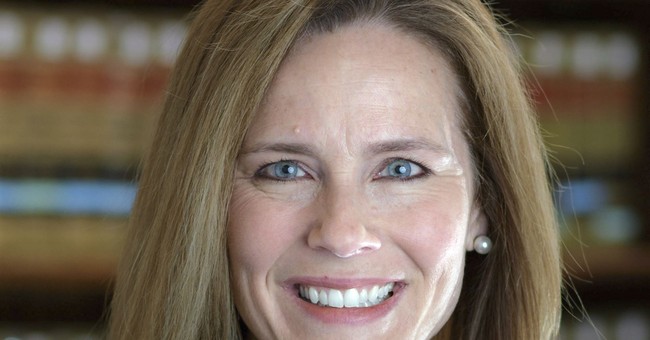1. The following was Barrett's response when asked about anti-religion bigotry.
"...I think when you step back and you think about the debate about whether someone’s religion has any bearing on their fitness for office, it seems to me that the premise of the question is that people of faith would have a uniquely difficult time separating out their moral commitments from their obligation to apply the law. And I think people of faith should reject that premise,” she added.
“All people, of course– well, we hope, most people– have deeply held moral convictions, whether or not they come from faith. People who have no faith, people who are not religious, have deeply held moral convictions,” Barrett noted. “And it’s just as important for those people to be sure– I just spent time talking about the job of a judge being to set aside moral convictions, personal moral convictions, and personal preferences, and follow the law. That’s a challenge for those of faith and for those who have no faith.”
2. She said the above in the context of "whether someone is Catholic or Jewish or Evangelical or Muslim or has no faith at all is irrelevant to the job,” Barrett added."
But that view ignores an element that has been removed from the views of our founders, a view that made America as exceptional as it once was: the sanctity of human life.
3. And it fails to mention a particular faith, one that abounds with a blood-lust above all else: Militant Secularism.
In all of its denominations, Militant Secularism is far, far from what is meant by 'morality.'
None of that religion have the slightest concern for human life: not communism (gulags), not Nazism (concentration camps), not Liberalism (abortion), not Progressivism (eugenics), not socialism (theft), not fascism (murder).
They serve a power many millennia old, once believed banished from Western Civilization, but, today, making a strong and virulent come-back.
It was put, succinctly, by Leon Trotsky: "We must rid ourselves once and for all of the Quaker-Papist babble about the sanctity of human life."
4. Whether personal beliefs, or what we call 'politics,' or perhaps 'religion,' the real idea that determines what we will do in any and every situation, is one simple idea. Either one believes that human lives are sacred, or one believes that they can be exchanged to achieve some secular material goal.
5. Choose a. or b.
a. From Schindler's List: “Whoever saves one life saves the world entire.”
or
b. Trotsky: "We must rid ourselves once and for all of the Quaker-Papist babble about the sanctity of human life."
If we must have judges, they should never be the sort who ignore government inspired slaughter of our fellow human beings.
"...I think when you step back and you think about the debate about whether someone’s religion has any bearing on their fitness for office, it seems to me that the premise of the question is that people of faith would have a uniquely difficult time separating out their moral commitments from their obligation to apply the law. And I think people of faith should reject that premise,” she added.
“All people, of course– well, we hope, most people– have deeply held moral convictions, whether or not they come from faith. People who have no faith, people who are not religious, have deeply held moral convictions,” Barrett noted. “And it’s just as important for those people to be sure– I just spent time talking about the job of a judge being to set aside moral convictions, personal moral convictions, and personal preferences, and follow the law. That’s a challenge for those of faith and for those who have no faith.”
2. She said the above in the context of "whether someone is Catholic or Jewish or Evangelical or Muslim or has no faith at all is irrelevant to the job,” Barrett added."
But that view ignores an element that has been removed from the views of our founders, a view that made America as exceptional as it once was: the sanctity of human life.
3. And it fails to mention a particular faith, one that abounds with a blood-lust above all else: Militant Secularism.
In all of its denominations, Militant Secularism is far, far from what is meant by 'morality.'
None of that religion have the slightest concern for human life: not communism (gulags), not Nazism (concentration camps), not Liberalism (abortion), not Progressivism (eugenics), not socialism (theft), not fascism (murder).
They serve a power many millennia old, once believed banished from Western Civilization, but, today, making a strong and virulent come-back.
It was put, succinctly, by Leon Trotsky: "We must rid ourselves once and for all of the Quaker-Papist babble about the sanctity of human life."
4. Whether personal beliefs, or what we call 'politics,' or perhaps 'religion,' the real idea that determines what we will do in any and every situation, is one simple idea. Either one believes that human lives are sacred, or one believes that they can be exchanged to achieve some secular material goal.
5. Choose a. or b.
a. From Schindler's List: “Whoever saves one life saves the world entire.”
or
b. Trotsky: "We must rid ourselves once and for all of the Quaker-Papist babble about the sanctity of human life."
If we must have judges, they should never be the sort who ignore government inspired slaughter of our fellow human beings.
Last edited:




